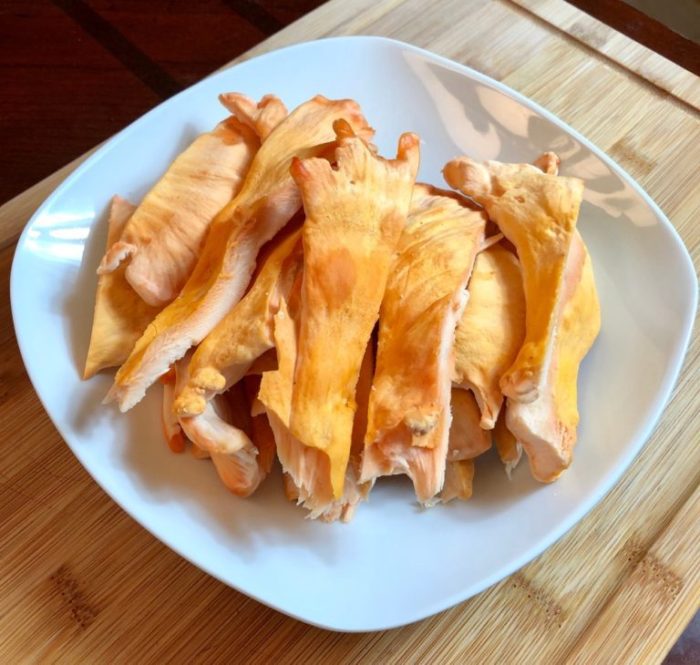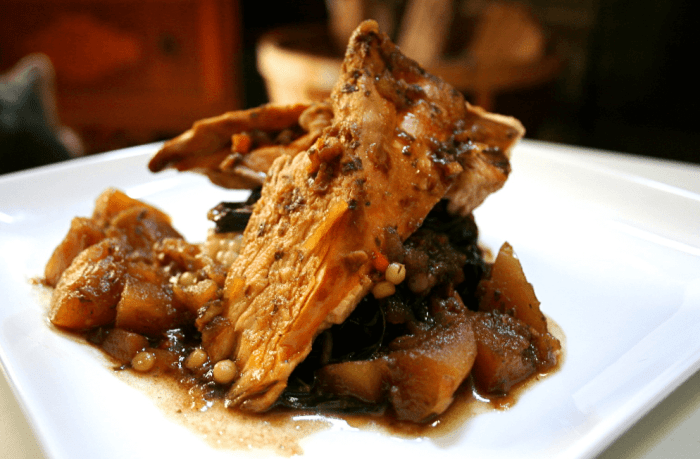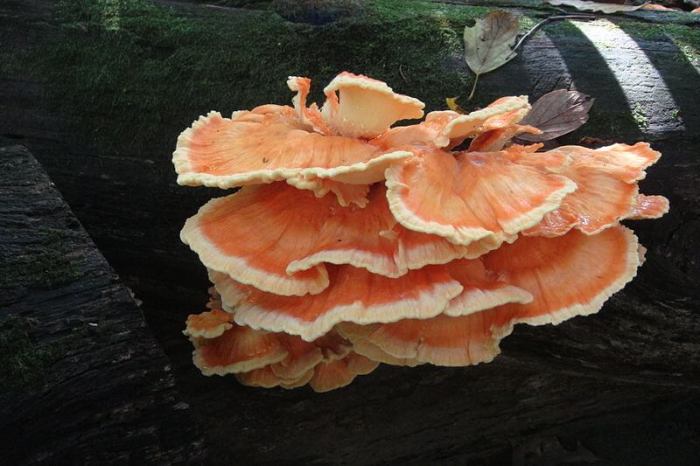
Chicken of the woods recipe, an enticing culinary journey that beckons food enthusiasts to explore the delectable depths of wild mushrooms. With its vibrant colors and meaty texture, chicken of the woods offers a unique and flavorful twist to your favorite dishes.
From the intricacies of preparation to the tantalizing flavors and health benefits, this guide will provide you with all the essential knowledge to master the art of cooking chicken of the woods. Embark on this gastronomic adventure and discover the hidden treasures of the forest.
Ingredients and Preparation: Chicken Of The Woods Recipe

Creating a mouthwatering chicken of the woods dish requires a carefully curated selection of ingredients and meticulous preparation techniques. Let’s dive into the essentials.
To begin, you’ll need fresh chicken of the woods mushrooms. Clean them thoroughly by removing any debris or dirt. Cut the mushrooms into bite-sized pieces to ensure even cooking.
Marinating
To enhance the flavor of the mushrooms, consider marinating them. Combine olive oil, soy sauce, garlic, and herbs in a bowl. Submerge the mushroom pieces in the marinade for at least 30 minutes, allowing them to absorb the savory flavors.
Chicken of the woods is a versatile mushroom that can be used in a variety of dishes. This chicken of the woods recipe calls for sautéing the mushrooms with garlic and onions, then adding them to a creamy sauce. Serve over pasta or rice for a satisfying meal.
Cooking Methods and Techniques

Chicken of the woods is a versatile mushroom that can be cooked in a variety of ways. Each cooking method brings out different flavors and textures, so experiment to find your favorite.
Grilling
Grilling chicken of the woods is a great way to get a smoky flavor. Preheat your grill to medium-high heat and brush the mushrooms with olive oil. Grill for 5-7 minutes per side, or until tender and slightly charred.
Sautéing
Sautéing chicken of the woods is a quick and easy way to cook them. Heat some olive oil in a large skillet over medium heat. Add the mushrooms and cook for 5-7 minutes, or until tender and browned.
Roasting
Roasting chicken of the woods is a great way to get a crispy exterior. Preheat your oven to 400 degrees Fahrenheit. Toss the mushrooms with olive oil, salt, and pepper. Roast for 15-20 minutes, or until tender and browned.
Flavor Profiles and Seasonings

Chicken of the woods possesses a meaty, savory flavor with hints of umami and a slightly nutty aftertaste. Its versatility allows it to complement various cuisines, including Asian, Italian, and American.
To enhance the mushroom’s inherent flavors, consider using a range of seasonings and sauces. Herbs like thyme, rosemary, and oregano add a touch of earthiness, while spices such as paprika, cumin, and chili powder provide warmth and depth. Marinating the mushroom in a mixture of soy sauce, olive oil, and garlic before cooking infuses it with savory and aromatic flavors.
Rubs
Rubs are a simple and effective way to add flavor to chicken of the woods. Combine your desired seasonings and spices, then rub them generously onto the mushroom’s surface. Allow it to sit for at least 30 minutes before cooking to allow the flavors to penetrate.
Brines
Brining is a technique that involves soaking the mushroom in a flavorful liquid for several hours or overnight. This process helps tenderize the mushroom while infusing it with moisture and flavor. Create a brine by dissolving salt and sugar in water, then add herbs, spices, and other aromatics.
Glazes
Glazes are applied to the mushroom during the last few minutes of cooking to create a glossy and flavorful coating. Mix honey, soy sauce, or barbecue sauce with your favorite seasonings and brush it onto the mushroom. The glaze will caramelize and add a touch of sweetness and depth to the dish.
Nutritional Value and Health Benefits

Chicken of the woods boasts an impressive nutritional profile, making it a valuable addition to a balanced diet. It is a good source of protein, providing essential amino acids for muscle growth and repair. Additionally, it is rich in fiber, promoting digestive health and satiety.
Beyond its macronutrient content, chicken of the woods is a treasure trove of vitamins. It is particularly high in vitamins B and D, which play crucial roles in energy metabolism and bone health, respectively. It also contains antioxidants like ergothioneine, which protect cells from damage caused by free radicals.
Potential Health Benefits
The nutritional composition of chicken of the woods suggests several potential health benefits. Its high protein content promotes muscle growth and repair, making it a suitable choice for athletes and individuals seeking to maintain muscle mass. The fiber content supports digestive health by promoting regularity and reducing the risk of constipation.
If you’re looking for a delicious and easy way to enjoy chicken of the woods, look no further! This chicken of the woods recipe is perfect for beginners and experienced cooks alike. With just a few simple ingredients, you can create a flavorful dish that will impress your friends and family.
Furthermore, the antioxidant properties of chicken of the woods may contribute to reducing inflammation and protecting against chronic diseases. Research suggests that ergothioneine, an antioxidant found in chicken of the woods, may have anti-inflammatory effects and protect against neurodegenerative diseases like Alzheimer’s and Parkinson’s.
Incorporating into a Balanced Diet
To incorporate chicken of the woods into a balanced diet, consider adding it to stir-fries, soups, salads, or pasta dishes. Its mild flavor and meaty texture make it a versatile ingredient that pairs well with various seasonings and cuisines. Chicken of the woods can also be roasted, grilled, or sautéed, offering a variety of cooking methods to suit different preferences.
It is important to note that chicken of the woods should be cooked thoroughly before consumption to avoid any potential digestive issues. Additionally, individuals with mushroom allergies or sensitivities should exercise caution when consuming chicken of the woods.
Presentation and Serving Suggestions

Chicken of the woods can be presented in various visually appealing ways, enhancing its culinary experience. Its vibrant orange color and unique texture lend themselves to creative plating techniques.
As an appetizer, chicken of the woods can be sliced thinly and arranged on a platter with a drizzle of olive oil and a sprinkle of fresh herbs. For a more substantial appetizer, it can be grilled or roasted and served with a dipping sauce.
Main Course
As a main course, chicken of the woods can be grilled, roasted, or sautéed and served with a variety of accompaniments. It pairs well with roasted vegetables, such as carrots, parsnips, and potatoes, or with a simple green salad.
Side Dish, Chicken of the woods recipe
As a side dish, chicken of the woods can be sautéed with garlic and olive oil and served with pasta or rice. It can also be added to soups, stews, and casseroles, providing a flavorful and nutritious addition.
Chicken of the woods is versatile and can be paired with a wide range of flavors. It complements earthy flavors, such as mushrooms and truffles, as well as brighter flavors, such as citrus and herbs.
Conclusion
As we conclude our exploration of the chicken of the woods recipe, it’s evident that these wild mushrooms are not just a culinary delight but also a testament to nature’s bounty. Their versatility and health benefits make them a valuable addition to any kitchen.
Whether you’re a seasoned chef or a home cook seeking new culinary experiences, the chicken of the woods recipe is sure to inspire and tantalize your taste buds.
Questions and Answers
Can chicken of the woods be eaten raw?
No, chicken of the woods should not be consumed raw as it may cause digestive issues.
What is the best way to clean chicken of the woods?
Gently brush off any dirt or debris with a soft brush or damp cloth. Avoid washing them under running water as they may absorb too much moisture.
How long does cooked chicken of the woods last?
Cooked chicken of the woods can be stored in the refrigerator for up to 3 days or in the freezer for up to 6 months.





